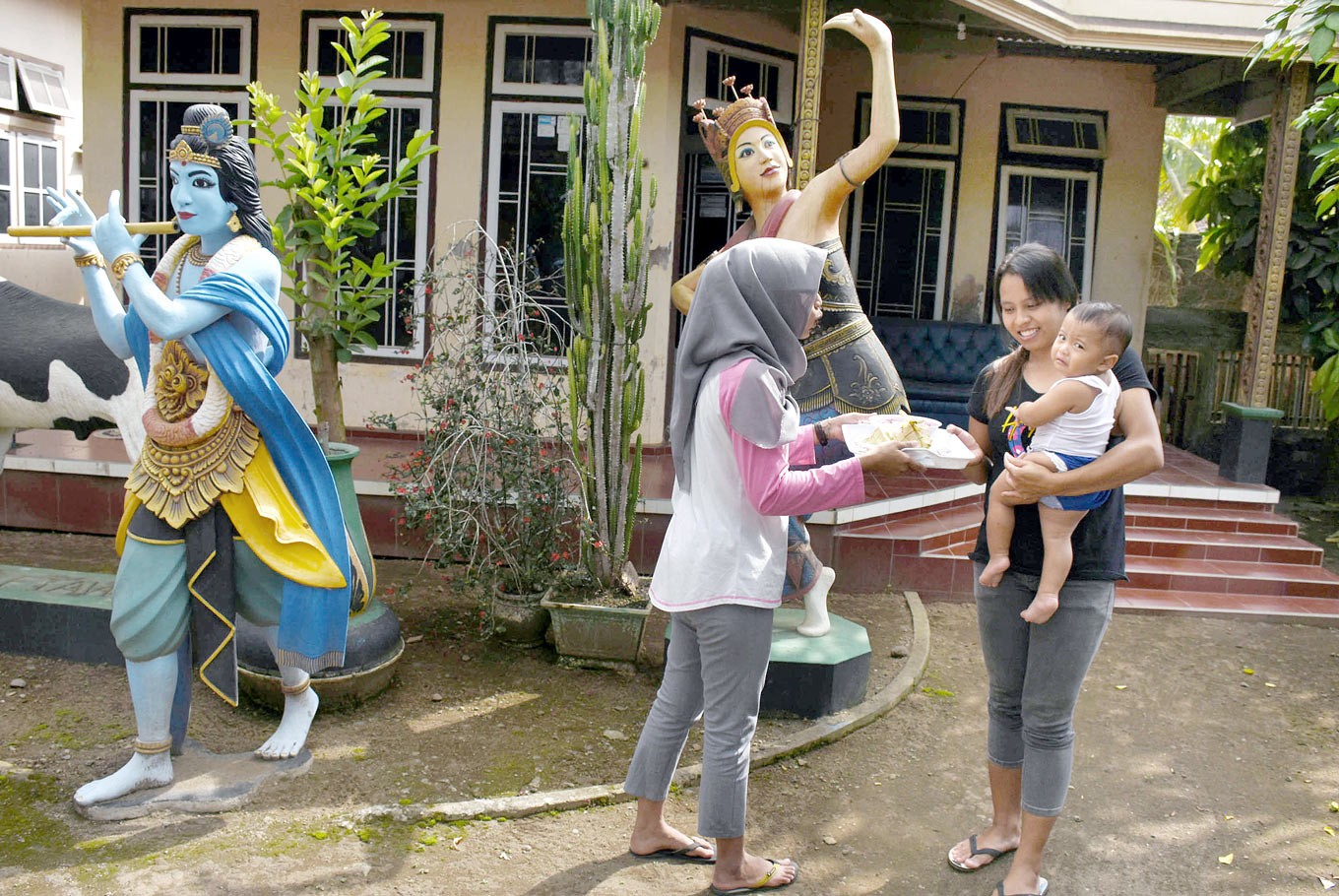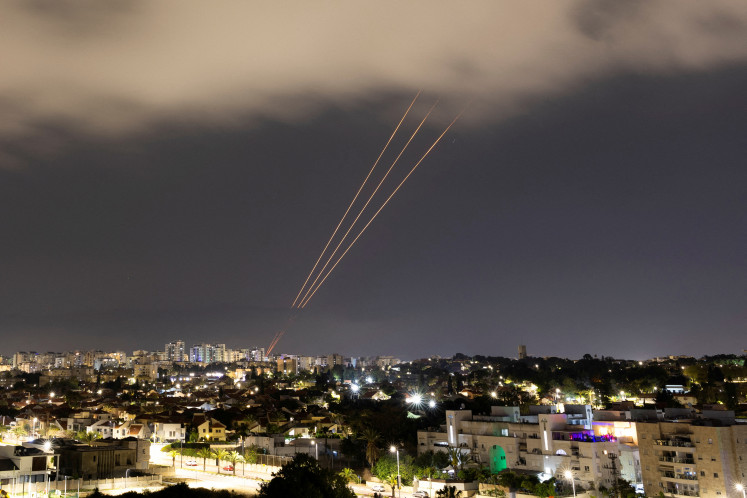Idul Fitri and its message of humanity
How can religion return its followers to their humane side? This question must be raised as each religion promises virtue to humankind.
Change Size
 Sharing is caring: Dwi Dharmawanti (left) hands a traditional ketupat to her Hindu neighbor, Diana Kristiani (right) during ketupat festivity in Pesanggrahan village, Banyuwangi. (JP/Aman Rochman)
Sharing is caring: Dwi Dharmawanti (left) hands a traditional ketupat to her Hindu neighbor, Diana Kristiani (right) during ketupat festivity in Pesanggrahan village, Banyuwangi. (JP/Aman Rochman)
I
dul Fitri literally means no longer fasting — the return to normal days. Ramadhan is akin to the mythic Kawah Candradimuka — the mental and physical training ground of wayang (Javanese puppet show) hero Gatotkaca. Idul Fitri marks the first day of the other 11 months in which we apply all we have trained for on a daily basis.
It is less our day of vindication than the beginning of our real struggle in self-control, which we were trained to maintain during Ramadhan.
In the last several months Indonesia has been rife with hate speech, hoaxes, vandalizing of houses of worship, persecution of minorities and individuals, and recently bombings in a number of places.
Religion is interpreted to fit pragmatic political interests, disrupting our fraternity as fellow citizens, fellow believers, even fellow Muslims. Bombing victims have done no harm against the perpetrators, which have included families with wives and under-aged children carrying what seem to be strong religious motives. Such acts of violence and intolerance rip at our conscience.
If religion permits actions that attack our own humanity, and as most Indonesians are supposedly religious, wouldn’t this trap us in mutual revenge through dangerous acts in the name of religion? How can religion return its followers to their humane side? This question must be raised as each religion promises virtue to humankind.
In Islam, each form of worship has a physical and spiritual dimension as does human nature. The same applies to fasting. Physically, fasting drills the body in surviving hunger, thirst and lust.
Spiritually, fasting trains self control from worldly pleasures, the permissible, the good and those entitled to us, let alone the forbidden.
Such mental training is crucial to enable humans to act according to their essence as servants of Allah (Abdullah) entrusted as God’s representatives on Earth (Khalifah fil Ardl) to bring about good (kemaslahatan).
Honing one’s faith or iman to bring about the good is challenging, as it cannot be achieved within the exclusive security of prayer rooms. Instead one must directly engage with real life amid diverse, often conflicting, interests.
For faith to advance civilization, it must embody critical reasoning, in understanding both religious teachings as well as social realities. Without such critical reasoning and knowledge of real problems faced by society, faith can be abused to strike the enemy, to silence the weak and even threaten the very values of humanity, which are the main mission of religion in the first place.
The wish for families to reunite in heaven is a noble desire. But one should think, can God’s heaven be attained by wounding and endangering society?
And can a husband carry out his mandate as the head of the family by taking along his wife and children in an act that endangers themselves and others?
Submission to other than Allah drives humans to view as halal even forbidden methods to achieve their wishes. If the desire for power is attempted through distribution of hoaxes, hatred, persecution and even bombings — which clearly destroy the fraternity of fellow Indonesians, religious communities and even fellow Muslims and society — this is clearly submission to power.
No matter how thick with religious justification it is.
The meeting ground of all religious communities is humanity’s problems. Since its beginning, religion encourages faith that engages directly with problems faced by human society.
Faith in Allah, as taught by the Messenger (Rasul) Moses, immediately addressed slavery, which was the result of the Pharaoh’s worship of power. The faith taught by the Rasul Luth addressed sexual crimes, the result of the people’s worship of lust. Similarly, the faith taught by the Rasul Muhammad, peace be upon him, confronted war and a usury-based economy which reflected a worshipping of material wealth, resulting in slavery.
Muhammad’s faith also directly addressed patriarchy which degraded females, a result of a worshipping of men.
This history shows that the quality of faith does not depend on the extent of praise believers give to Allah, but in their strong motivation to overcome humanity’s problems. As former Islamic leader and former president Abdurrahman “Gus Dur” Wahid reminds us, God needs no defending; it is Allah’s servants who are treated unjustly who must be defended. Religious interpretations and actions which undermine humanity are therefore the greatest affront to religion itself.
If all religions exist for the wellbeing of humanity, then every religion bears the same responsibility to overcome the problems faced by human society. Therefore, facing such problems becomes the area in which diverse religions can meet.
Faith in God is subjective and immeasurable. Only God and the individual know the extent of his or her faith.
However, human wellbeing, which should be the outcome of faith, is entirely measurable, in line with the need of every human being to be treated humanely.
We cannot unite humankind within single religions, but we can unify all religious communities to overcome the problems faced by all humankind.
Religious communities must work shoulder to shoulder in overcoming our shared problems — human trafficking, drug abuse, stunting, sexual violence, domestic violence, evictions, environmental destruction, child marriage, religious radicalism and other issues.
When one religious community continues to be hostile to another, all religious communities would likely forget their shared enemy — the denigration of our common humanity.
Ali bin Abi Thalib, a cousin and son-in-law close to the Prophet Muhammad, once said that those who are not your brother/sister in religion are brothers/sisters in humanity. Now we can say that those who are your brothers/sisters in humanity are brothers/sisters in carrying out the core mandate of all religions.
Fasting during Ramadhan has improved our ability to keep a safe distance from various physical pleasures, and sharpen our spiritual eye, so that we can be more critical in carrying out our faith and hold steady onto our values of humanity.
If this occurs then Idul Fitri can indeed be viewed as the moment to return to the original nature (fitrah) of humans — the desire to only submit to God and constantly seek benefits for humankind in the widest meaning.
***
The writer, a lecturer at the postgraduate program of the Institute for Quranic Studies (PTIQ) Jakarta, is a member of the Indonesian Women’s Ulema Congress (KUPI) nationwide network.









